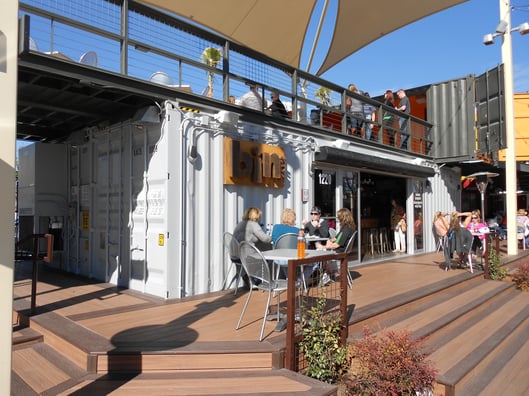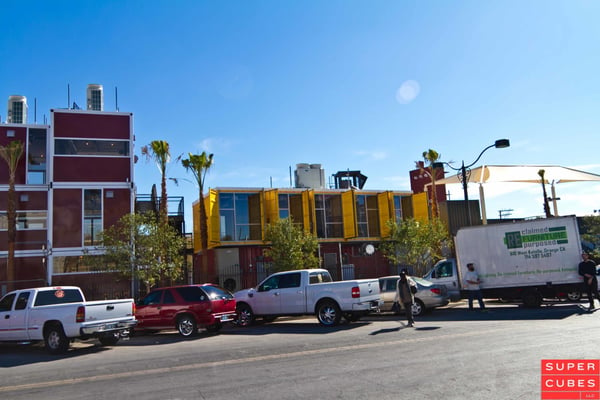Container Projects - Turning Inspiration Into Reality

Debbie Glassberg from Homecontained.com built this beautiful container home
Container homes - and other buildings - are all the rage on the internet right now. If you need proof, check out this home (or this second one on it), or this one that is still in the planning stages for veterans. They are also being used for other things - like this BaseFit gym, or this restaurant in Tampa. Tesla has gotten into the action with their container pop-up store. These projects are awesome and wonderful! It is great to see that ideas that people can imagine are turning into reality.
But the calls I get every day are about people who have the idea and don't know what to do next. There are some obvious things - find out how much a container costs. And some less obvious ones - make sure that your design is structurally sound so it doesn't collapse on you. And the ones that sound tricky - is a container allowed where you want to put it? Who do you ask? So I thought I'd tackle some of those issues today. Here are some things to consider when you are starting to plan out your container project:
1) Do you have a design? Designs are critical. Have you drawn it out? Is that design something you drew up on the back of an envelope or did you have an engineer work on it for you? How detailed is it? Eventually you will need an actual detailed planned that includes dimensions and those critical details like electricity, plumbing, insulation, etc, if you plan to use your container as a home, office or business. And if you plan on cutting up your container, you'll want those designs to be reviewed by a structural engineer or architect and they will proably need to to be approved by your local building permitting office. You may not need to do all of this on day 1, but you should probably have a plan to do it eventually.
2) Is your property zoned for it? What about containers? Will your zoning department approve them? Generally you want to find this out pretty quickly because if you can't put a container there, you really have to reevaluate if you want to move the project somewhere else or change the design. We can help you with this. We are now offering a Feasibility Study that looks at zoning, permitting, the property for suitability, where you designs are at and gives you a general idea if it will be feasible from a permitting and design standpoint. The cost for the study is fairly affordable - under $2000, but we do add travel cost for our team on top of that. Those costs will vary depending on where the project is located, how big of a team we will need to get the study done and the scale of the project.
3) Do your goals for the project and budget line up? People want to use containers for so many great reasons. Some want to upcycle a container that has already been used. Others want to get those beautiful, clean, industrial lines of one-trip containers that would look right in Architectural Digest. Some people want to use containers for cost-savings and others are encouraged for aesthetic reasons. But those reasons can lead you in different directions - and by extension, different budgets. If you are looking for upcycling a used container and you want to keep the budget in check, those two work together beautifully. If you are looking for something that looks good in glossy magazines, but want to pay next to nothing for your house, there might be a disconnect between the two. On the topic of budgets, please remember that the container is only 1 part of the puzzle. If you plan on having an insulated structure with electricity and plumbing, those material and labor hosts are not going to disappear because you are using a container. They will fluctuate just like any other building.
4) Are you going to do the work yourself or use a contractor? Some people are super handy and can do just about anything. I've been lucky enough to meet a ton of people like this. I'm not super handy myself, so I'm always a bit in awe. For people who are more like me, consider getting a general contractor to help you out. They generally have tried and true sub-contractors and know how all the pieces of the project need to work together to get things done right. If you are looking for more off-the-grid or green elements to your project, you may want to find contractors who have done projects like that before so they are used to the unique projects and systems used in those projects.
5) Do you have vendors for some of these functions? If you've been reading and making a list of the help you're going to need, do you have vendors in mind? You may want to do some research on those types of vendors to see if there are ones in your area that are used to working on container projects or are open to it.
As more and more people do container projects, we're also getting more and more articles about things people have learned from their projects. Here are a couple of articles that might give you a little more insight into what to expect. Here is why containers are completely wonderful. And lastly, here is an article about how to buy a container for a container project. For the most part, they got it right. However, I would make a few corrections. First, as a reputable container dealer, I agree you want to buy from someone who is trustworthy. (We're members of the Better Business Bureau and the National Portable Storage Association!) But we'll happily sell you a single container and help with delivery. We are happy to meet your needs. The other is a picky point - we cannot track the lifespan of a container. What's been in it is anyone's guess. But we do agree with them in that inspecting the container is really the best way to know what you're getting.
With a bit of planning and research, your container inspiration can be a reality.




Tags:
June 26, 2015
